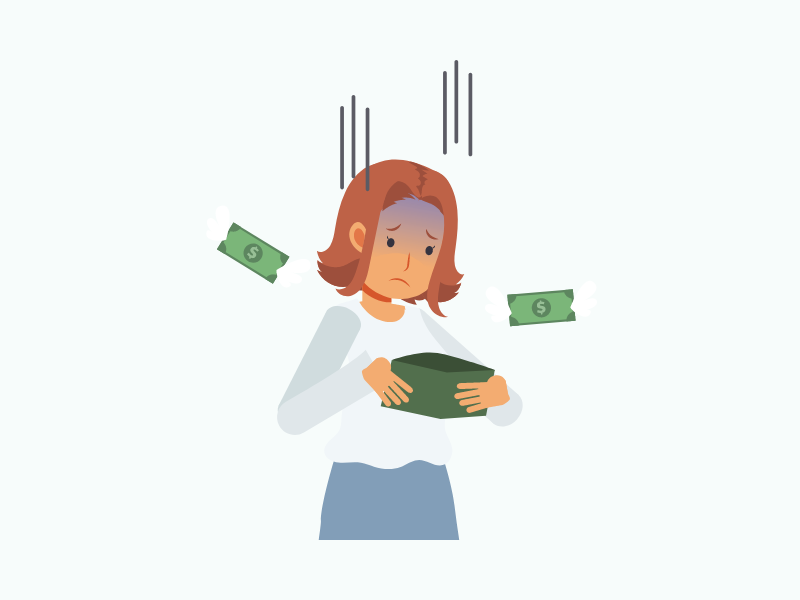5 Money Habits That Prevent You From Becoming Rich

Have you ever thought about why you cannot seem to grow your net worth, even though you make decent money?
The reason is probably due to your money habits. We all have patterns that our brain is adjusted to and automatically does without thinking much about, like brushing our teeth when waking up or taking a shower.
Unfortunately, we also have habits or patterns regarding our finances. These habits determine whether you will be successful with your finances or not.
This is why it is important to set good money habits, or else you will always find yourself struggling financially.
If you want to learn more about setting good habits, I recommend you read the book Atomic Habits by James Clear. It will give you an understanding of how to break bad habits and how to start and stick to better ones in the long term.
Now let's discuss some of the habits that may be hurting you financially.
1. Paying Yourself Last
One of the most enlightened moments I had was when I learned of the concept “Pay Yourself First” from the book Rich Dad, Poor Dad.
In today’s society, the majority of us are accustomed to receiving our paycheck, then paying off all our expenses and bills that are necessities, and then whatever is leftover is usually spent on other leisure activities.
Sometimes, a paycheck is not enough to cover expenses, which leads to credit card debt. And this cycle goes on forever because that is the “normal” thing to do nowadays.
However, Robert Kiyosaki introduced us to this concept of paying ourselves first in his book, Rich Dad, Poor Dad. The concept here is that once we get our paycheck, we have to pay ourselves before giving any money out to pay bills or other expenses.
In what ways do we pay ourselves? Well, that is a good question. You should set an amount of every paycheck that will go directly to buying your assets, such as stocks, real estate, or businesses. These are things that are going to bring money into your pocket.
This needs to happen before you pay your expenses, which are also called liabilities. They are liabilities because they take money out of your pocket. If you do not have enough money to pay your expenses after paying yourself first, then that is a sign.
A sign that you should either reduce your liabilities or increase your income in order to afford to pay your liabilities. But always remember that paying off your liabilities always comes after buying your assets (paying yourself first).
2. Having an Impossible Budget
People usually look the other way once someone mentions the word budget. And quite frankly, I do not blame them.
A budget usually means that you have to limit your spending. Or cut out some of your expenses. That is definitely not something I would want to do either. The issue is that most people overestimate their budgets, which is why they are unable to stick to them.
For instance, you cannot just blindly say I'm going to start spending less on every single one of your expenses. This will cause you to break that budget or give up on it altogether within the first couple of weeks.
But my solution to that is something called a "conscious spending plan." A conscious spending plan is something I learned after reading the book I Will Teach You to Be Rich by Ramit Sethi.
This plan is different from having a budget. A budget is usually set to limit how much money you can spend on all different sorts of items or categories.
But a conscious spending plan reduces the amount you spend on items you care less about and increases the amount you spend on the stuff you actually care about.
For example, I reduced the amount of money I spent on buying lunches every week at work by taking food from home 2 or 3 times a week. This allowed me to save some money that I then allocated to my travel fund.
So I basically saved money in one category of my expenses and transitioned the money saved to another category that I actually care about.
The benefit of also setting a conscious spending plan is that you allocate a job to every dollar you earn. This means you know where you are going to spend every dollar before it enters your bank account.
3. Not Investing Enough
The sad truth is that the majority of people are either scared or lazy about getting started on their investing journey.
Unfortunately, most people only have a 401K as their investment vehicle. This is usually due to their employers providing them with this benefit. If it were not for that, I know many of my friends and colleagues would not even be investing at all.
To help those people out, I would recommend they read the book The Simple Path To Wealth by J. L. Collins.
The beautiful thing about this book is that it shows how simple investing and making money in the stock market can be. It is not hard, complicated or time-consuming like the media makes it out to be.
Collins, in his book, demonstrates how anyone can make money by investing their money for the long term using simple and proven strategies that anyone can implement today. He goes over different investment vehicles and how to maximize your returns.
I also like that he is against the idea of hiring a financial advisor to manage your money for you. I totally agree with that because no one is going to care about your money more than you do.
So do yourself a favor and dedicate some time to learning how to grow your money yourself.
4. Being In The Wrong Circle
One of the most costly things to do is surround yourself with people who are not financially educated. This will, in turn, result in you becoming just like them.
Being around people who always want to party, go to expensive restaurants, travel luxuriously, or constantly live paycheck-to-paycheck is going to financially drain you.
This is because you are going to want to fit in with them and ultimately do the same as they do.
It is important to set boundaries and make it clear to the people around you that you have a conscious spending plan. Do not be afraid to say you can only afford certain things and other stuff is out of your budget.
If you find yourself constantly chasing materialistic things in order to fit in with those around you, then you may be in the wrong circle.
5. Adding to Your Debt
Unfortunately, many of us have grown accustomed to buying things we cannot afford. People are far too accustomed to swiping their credit cards for items they cannot afford.
Let me say it again: we've grown too accustomed to swiping our credit cards to buy things we can't afford.
If you are someone who is irresponsible with their credit cards, then you will have a very hard time growing your wealth. The reason is that credit cards are the worst type of high-interest debt you can have.
Credit cards are notorious for having high interest rates. So, every month that goes by when you only make the minimum payment, you are actually owing the bank even more money because of compounded interest.
The average interest rate for credit cards is about 20%. Using a simple financial rule like the rule of 72, we learn that it will only take you about three and a half years to double the amount you owe to the bank.
This means that if you took out $3,000 in credit card debt, it will only take 3.5 years to double and you will owe $6,000 if you are unable to make your payments.
Which is why it is important to be responsible with your money and only buy what you can afford. Again, having a conscious spending plan will help you with that.
In his book, I Will Teach You To Be Rich, Ramit also talks about how to get rid of debt.
Enjoy your new week!
Muhamed

